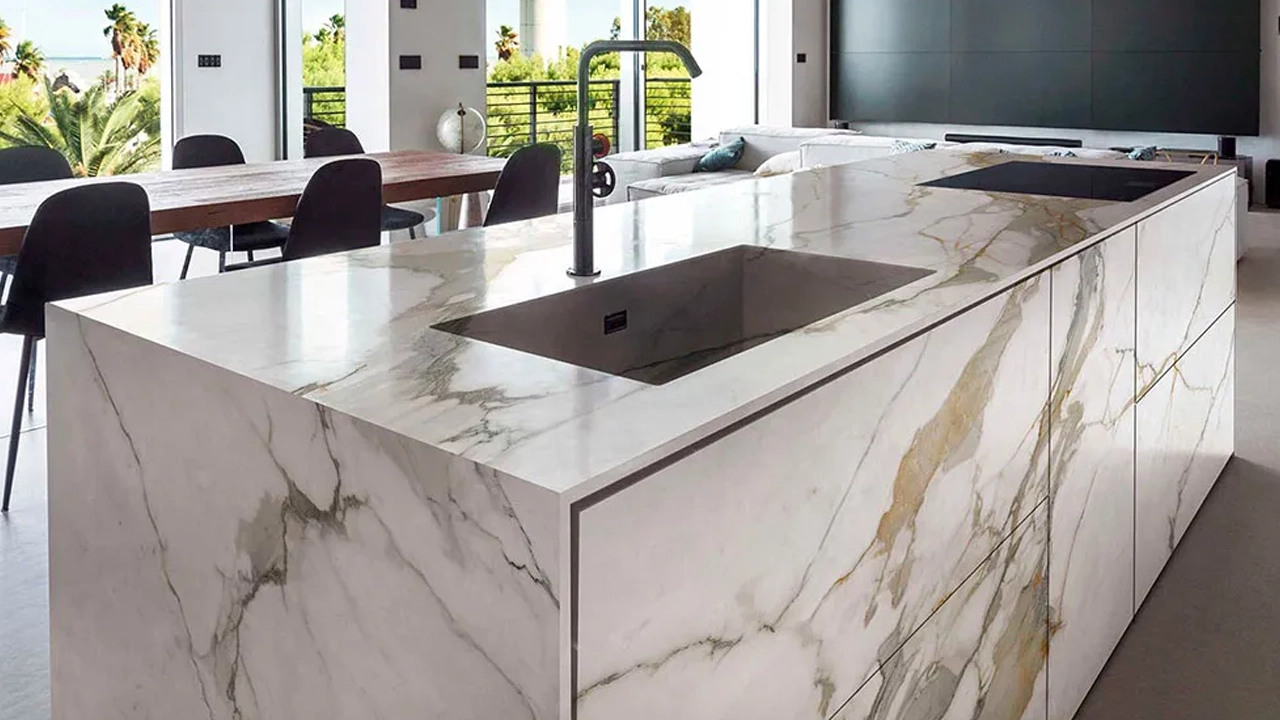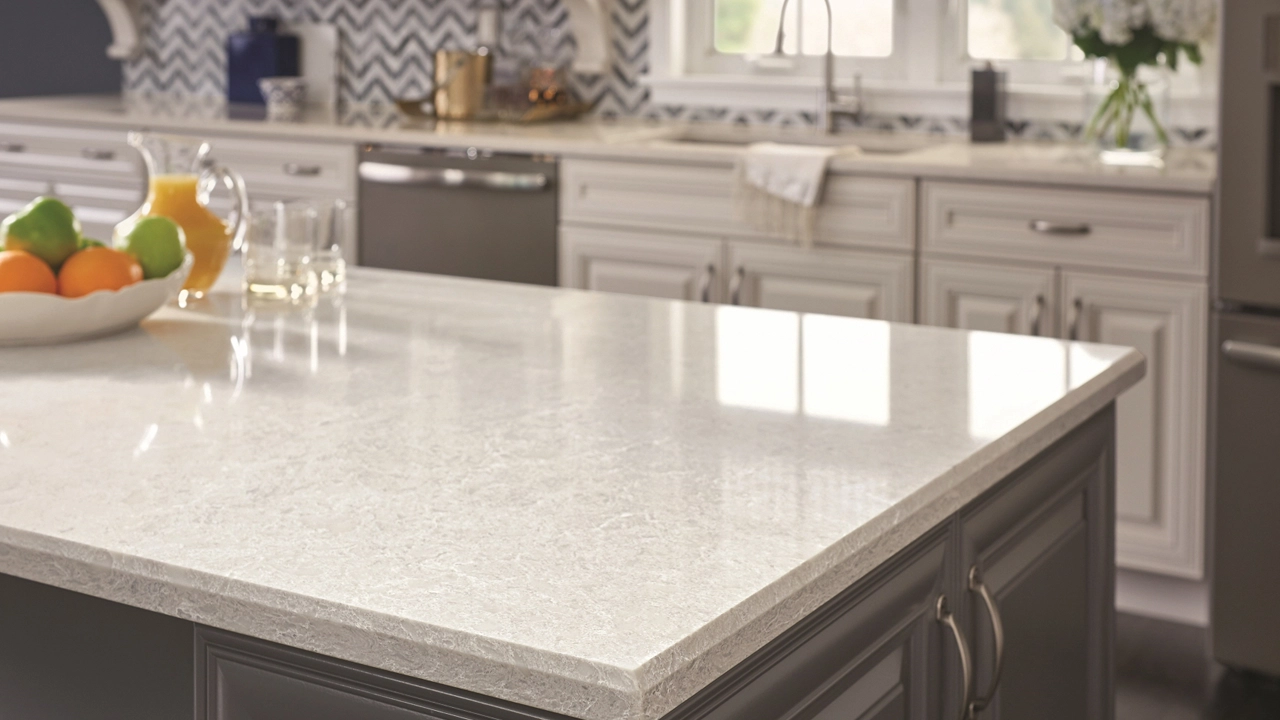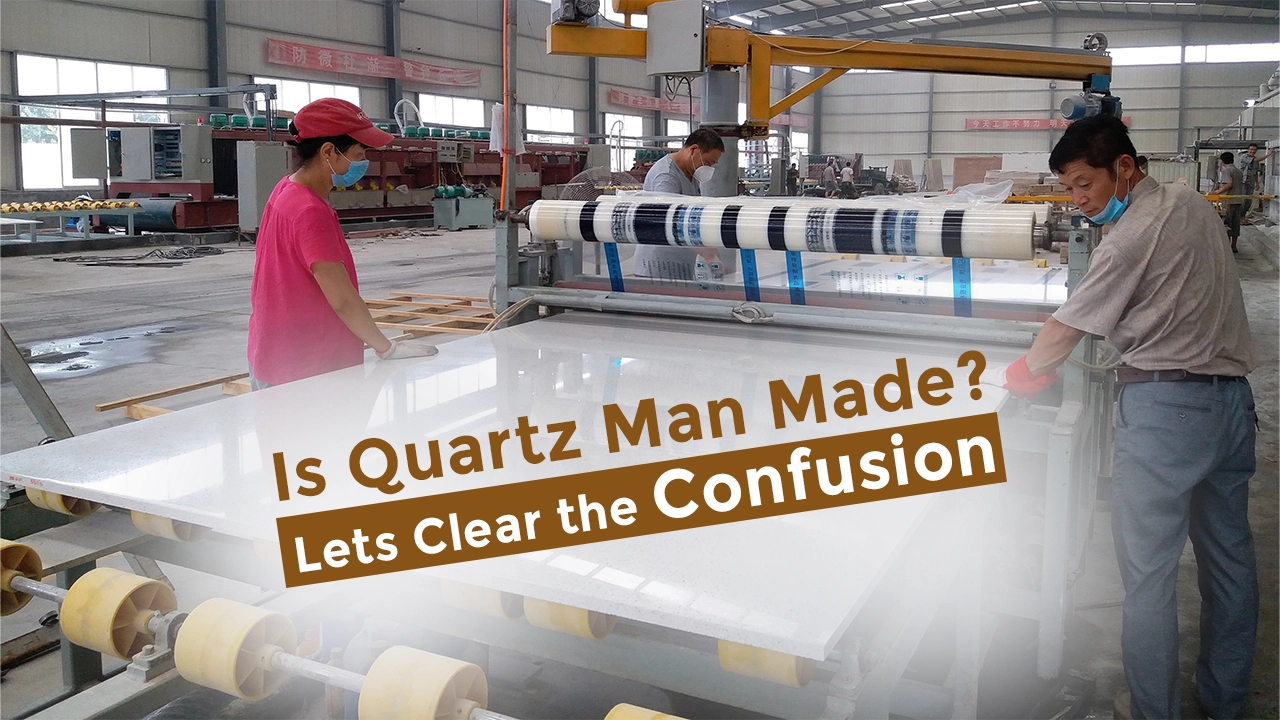I have heard such stories about quartz countertops. People say that they are strong, beautiful, and modern. Each time I would ask someone they would give me a different answer regarding one thing, is quartz man made? Some said it’s natural. Others said it’s engineered. Quartzite was then brought up, and just added to the mix. I didn’t know what was true and what was false.
So, let’s make this simple.
Natural mineral found in the earth is quartz. But quartz countertops are man-made. It is made from natural quartz crystals as well as special materials like adding resins, colors, etc. The 360 goes a long way towards changing how the countertop looks, let alone how it performs.
This difference is important. Knowing if the countertop is natural or man-made while deciding to choose your kitchen or bathroom countertop is essential. How you cleaned it, how much it costs, and for how long it lasts affects it. To add to it, some folks mislead quartz for quartzite, or muddle it with granite and marble, that are natural stones.
Let’s break this down step by step.
What is Quartz? A Natural Wonder
One of the most common mineral on the earth is Quartz. Its origin is in rocks deep in the ground. It is strong, hard, and nearly universal. It probably appears in jewellery, watches and also electronics. Sure enough, this same crystal is also put in your kitchen countertops.
Quartz has been put to use for several reasons, because it’s so strong and shiny. However, simply because quartz is natural does not mean that every quartz product is natural. Here is the confusion. There is no universal face of what quartz is, and therefore when people ask is quartz natural or man made the real answer is, it depends.
If this is a chunk of clear quartz, it is natural. Of course, if you’re wondering what shiny countertop is in your neighbor’s kitchen, well, that is a different story.
What Are Quartz Countertops Made Of?
Let’s be clear. Quartz countertops are man-made. Natural quartz crystals are taken by people, ground into powder, mixed with special resins and pigments and pressed into hot, soft mass that is cut into pieces. In fact, it creates a solid surface looking like stone but more in fact, engineered.
These countertops are usually 90, 95 percent real quartz, but the other material that holds the whole thing together is manmade. So that is why it is called man made quartz even though you get a lot of the real mineral.
Then it is poured into molds to make slabs. It’s then hardened, polished and cut so it can fit the kitchen or bathroom. When you hear quartz in the countertop world, you actually are never talking about solid stone, like granite or marble.
That’s why if you have been thinking of what is man made quartz or how is man made quartz made and all that, that’s your answer.
Quartz vs Quartzite: What’s the Difference?

This is where people really mislead. The same sound coming from a crystal is quartzite and quartz, but don’t think they are the same.
Quartzite is a natural stone. The sandstone and quartz crystallizes together when sandstone is pressed together over millions of years. As people did with granite or marble, they cut quartzite directly from the earth.
However, quartz is man-made, the type most often used in countertops. It’s engineered in factories. Quartz is man-made while quartzite is natural. And if someone asks you the question is quartz or quartzite man-made, the answer is: Quartz is man-made; quartzite is not man-made.
This is a big deal as it makes you change the way you clean, seal and use the material. Quartz does not need sealing and has a more uniform appearance. More natural and with great, random patterns, quartzite does still need sealing to prevent staining.
How Is Man-Made Quartz Made? The Process Explained
In fact, it is interesting, how to make quartz countertops. Here’s how it works:
- Small pieces or powder of natural quartz crystals are collected and crushed.
- Resins and color pigments are mixed with these to arrive at the desired look.
- Generally, the mixture is poured into a mold and pressed under very high pressure.
- After making the soup, the slab is baked in an oven in order to make it hard and durable.
- It is then polished, finally, to get a nice shiny, smooth finish.
So manmade quartz is created in this way to make the strong, stylish surface we see in kitchens and bathrooms. Thus, when you have any questions about how man-made quartz is made, it occurs by mixing of nature and science.
Pros and Cons of Man-Made Quartz Countertops
Quartz countertops have a lot of good about them. There are also a few things to take into consideration before buying.
Let’s start with the good:
- Quartz is non-porous. This means it does not absorb liquids, so you don’t have to close the lead.
- This is a great, scratch and stain resistant, easy to clean surface great for a busy kitchen.
- It is available in many colors and patterns, even marble or granite like.
- It is easy to clean. Just use soap and water.
Now the things to watch out for:
- Quartz is not heat-proof. Use trivets as hot pots can damage the surface.
- Some natural stones are cheaper and some are more expensive than it is to buy.
- Others find it too perfect looking and a non-natural stone feel.
- Once placed in direct sunlight for many years, it fades.
If you are wondering whether man-made quartz heat resistant or man-made quartz is expensive, the answer is yes it is heat resistant but not very much. Of course, it can cost more, it depends on the brand and design.
Is All Quartz Man-Made? Not Quite
This is an important question. Is all quartz man-made? No. In fact, the quartz mineral itself is a natural one. It exists in nature., you can find it in rocks, and crystals.
The products in stores that say ‘quartz’ are engineered. You might find natural quartz stone in your garden, but the quartz used in countertops is man-made
This allows you to choose better for your home.
Quartz vs Other Countertop Materials
| Feature | Quartz | Granite | Marble |
| Material Type | Man-made | Natural Stone | Natural Stone |
| Durability | Very durable, scratch-resistant | Durable, but can scratch | Easily scratched and stained |
| Maintenance | Low, no sealing needed | Needs sealing and maintenance | Requires sealing and regular care |
| Appearance | Uniform, customizable | Unique with natural variations | Elegant, unique veins |
| Heat Resistance | Moderate | High heat resistance | Low heat resistance |
| Cost | Mid to high | High | High |
Other Uses of Quartz in the Home

It doesn’t stop with countertops, quartz is used for many other types of home furniture. It is also used for parts of the home other than the doors.
Quartz tiles can be used on the floors. They are very strong, easier to clean, and very practical. Quartz backsplashes are used by many people in order to match their countertops. Some of them choose to use it for tables and walls to create a more modern look.
If you were wondering whether quartz is a man-made product, the answer is yes, and it works beautifully in areas beyond the kitchen
Final Words
Therefore, does it make sense to go with quartz? Let’s make it simple.
If you want the look of modernity, a smooth surface, and easier to clean it out, your best option is to choose quartz. People that don’t want to worry about sealing, stains, or scratches will love it. Additionally, it’s also great if you want something that fits your design ideas.
If you are in love with natural stone with random patterns but don’t want quartz, try to skip quartz. Or, if you plan to place your countertop in direct sunlight or outdoors.
Now that you know quartz countertops are man-made, you can understand why they’re so popular.. However, it’s a beautiful and smart product combining the best of nature and design.
Ready to choose the perfect quartz countertop?
Explore a wide range of stunning and high-quality quartz slabs Visit the collection here. Whether you want a modern look lasting durability or low maintenance we have the perfect surface for your kitchen or bathroom
Visit our collection now and bring your dream space to life with premium quartz


